高一英语备课《Module 5 A Lesson in a Lab》-grammar学案(1)(外研版必修1)
外研版必修一Module 5 A Lesson in a Lab grammar教案
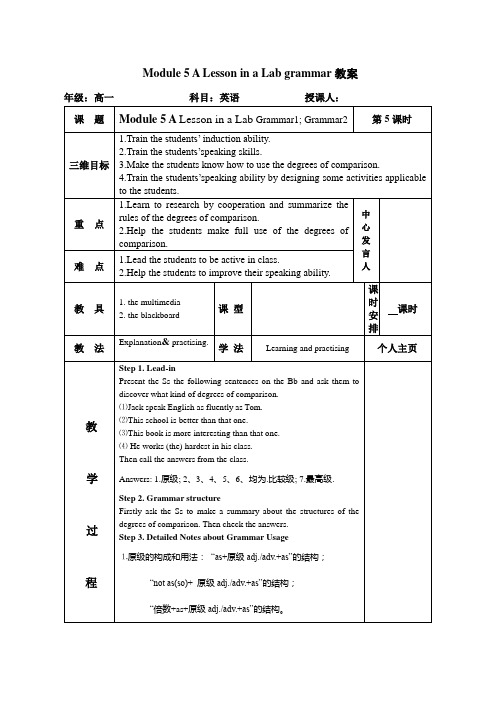
难点
1.Lead the students to be active in class.
2.Helpthe studentsto improve their speaking ability.
教具
1.the multimedia
2.the blackboard
课型
课时安排
课时
Байду номын сангаас教法
Explanation&practising.
Step 4. Practice
Step 5. Homework
1.Finish the exercises 2, 3 & 4 on page91-92 in their workbook.
2.Preview the rest of this module.
教后
反思
审核人签字:年月日
⑸被比较的双方必须具有可比性。
⑹连词than后使用代词主格和宾格有时意义不同。例如:
I know you better than he.我比他更了解你
⑺most前面加不定冠词a/an,或者不加冠词修饰形容词时,它的意思等于very。此时,most已失去最高级的意义。试比较:
a most interesting film(一部很有趣的电影) / the most interesting film(最有趣的电影)
Jack speak English as fluently as Tom.
This school is better than that one.
This book is more interesting than that one.
He works (the) hardest in his class.
Module 5—A lesson in a lab课文翻译解析
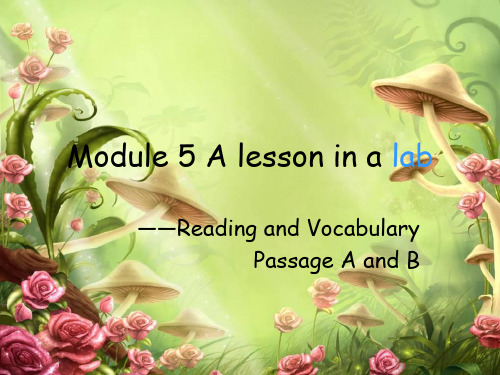
铁在无空气的水中 方法:(1)把试管中加入一半水; (2)将水烧开保持3分钟(这样可以保证 水中无 空气); (3)在水中放2~3枚洁净的铁钉; (4)在水中加些油,这样做可以防止空气进入水 中; (5)把试管放置一周。 结果:铁钉在没有空气的水中未生锈。 结论:铁在没有空气的水中不生锈。 铁在普通的水中 方法:(1)在试管中加入一半水,并在水中放2~3枚洁 净的铁钉; (2)把试管放置一周。 结果:铁钉在含有普通水的试管中生锈。 结论:铁在普通的水中会生锈。
Translation B
一个简单的科学实验 下面是对一个简单科学实验的描述。它向我们表明了铁是 怎样与空气和水反应的。 目的: 弄清铁是否在下列状态下生锈:(a)在干燥的空气中;(b) 在没有空气的水中(没有空气的水);(c)在普通的水中。 仪器: 3颗洁净的铁钉、试管、试管夹、棉花、油、本生灯(即煤气灯 或是喷灯) 铁在干燥的空气中 方法:(1)把若干铁钉置于试管底部; (2)顺着试管塞入一些棉花;(3)把试管放置一周。 结果:一周后,铁钉未生锈。 结论:铁在干燥的空气中不生锈。
• • • • •
• • •
•
Leave sth+地点 把某物落在某地 Leave sth. With sb. 把某事/某物委托给某人 Leave sth. behind 把某事/某物抛在后面 Conclusion n. 结论 Come to a conclusion = reach a conclusion =draw a conclusion 得出结论 in conclusion 最后 boil vt. 煮;煮沸 boiling water 正沸腾的水;boiled water 烧开的水 类似的还有:the rising sun 正升起的太阳 the rised sun 升起的太阳 a developing country 发展中国家 a developed country 发达国家
高一英语Module 5 A Lesson in a Lab外研社知识精讲

高一英语Module 5 A Lesson in a Lab外研社[本讲教育信息]一. 教学内容:Module 5 A Lesson in a Lab二. 重难点讲解1.heat vt.& vi. 加热;变热;使温暖 n. 热,热爱〔1〕Please heat the room, it’s too cold.〔2〕The hall will not heat up easily.〔3〕The sun gives us heat and light.2. expand v. 扩大,增加,增强,扩展;contract. v. 收缩,缩小,缩短;Metals expand when they are heated.Metals contract as they get cooler.3. substance n. 物质〔1〕What substance does it consist of?〔2〕This is a chemical substance.4. aim n. 目标 v. 瞄准,对准,力争……Take careful aim at the target before firing.He aimed his gun at the target, fired and missed it.5. react v. 作出反应,回应搭配: react to sb./sth.react against sb./sth.6. put … in order 把……有序排列,整理相关:in order 有序的out of order 无序的by order of …奉……的命令place an order with sb. for sth.in order toin order that7. be supposed to相当于shouldYou’re supposed to pay the bill by Friday.You’re not supposed to play football in the classroom.8.The closer you are, the more you’ll see.the more…. the more 结构是一种非常重要的形容词比较级结构,比如:The sooner we get this finished, the better we’ll be pleased.The harder we study, the more beautiful life we’ll have.9. It’s hard to think of a world without metals.本句中,it 为行事主语,真实主语是不定式to think of a world without metals,这是一个重要的不定式做主语的结构。
module5-a-lesson-in-a-lab-grammar(共43张)
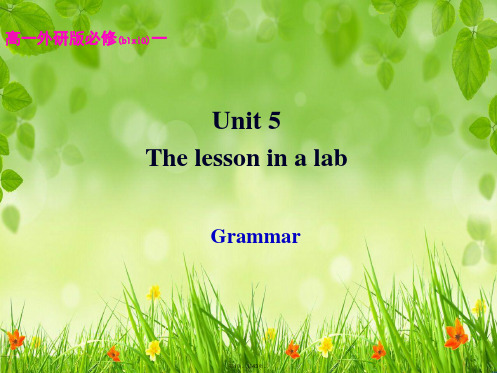
第14页,共43页。
3. My aunt’s house is twice as large as
my house. My aunt’s house is twice larger than my
house
4. Tom weighs over twice as heavy as Lily.
Tom is over twice heavier than Lily.
第15页,共43页。
12 years old
119 years old
The old woman is about __t_e_n__t_im__es
earth. (far)
Can you write more senten3页。
Diameter 直径(zhíjìng)
Earth=1 Jupiter=11
(big/size)
A: Jupiter is eleven times
as big as the earth .
heavy is object B?
400 kilogrammes.
第9页,共43页。
Grammar 1 – 3.Rules First study the sentences and make a conclusion of the comparative structure of adjectives.
第2页,共43页。
Example:
A: The Yangtze River is about three
times as long as the Songhua River.
外研版高中英语必修一备课Module 5 A Lesson in a Lab3rd period教案
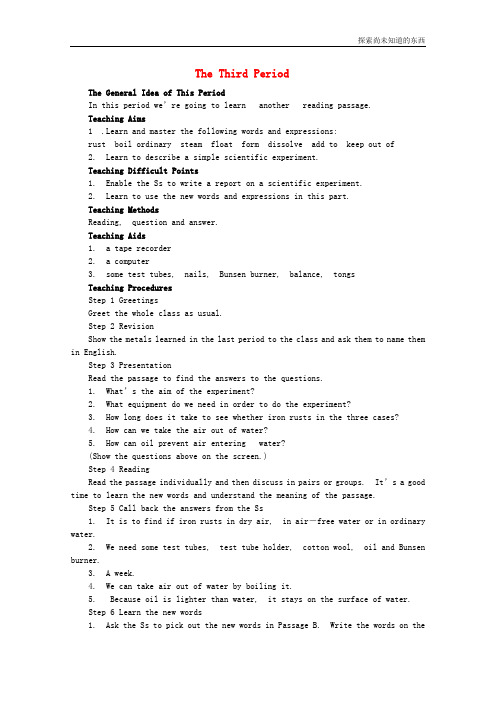
The Third PeriodThe General Idea of This PeriodIn this period we’re going to learn another reading passage.Teaching Aims1 .Learn and master the following words and expressions:rust boil ordinary steam float form dissolve add to keep out of2. Learn to describe a simple scientific experiment.Teaching Difficult Points1. Enable the Ss to write a report on a scientific experiment.2. Learn to use the new words and expressions in this part.Teaching MethodsReading, question and answer.Teaching Aids1. a tape recorder2. a computer3. some test tubes, nails, Bunsen burner, balance, tongsTeaching ProceduresStep 1 GreetingsGreet the whole class as usual.Step 2 RevisionShow the metals learned in the last period to the class and ask them to name them in English.Step 3 PresentationRead the passage to find the answers to the questions.1. What’s the aim of the experiment?2. What equipment do we need in order to do the experiment?3. How long does it take to see whether iron rusts in the three cases?4. How can we take the air out of water?5. How can oil prevent air entering water?(Show the questions above on the screen.)Step 4 ReadingRead the passage individually and then discuss in pairs or groups. It’s a good time to learn the new words and understand the meaning of the passage.Step 5 Call back the answers from the Ss1. It is to find if iron rusts in dry air, in air-free water or in ordinary water.2. We need some test tubes, test tube holder, cotton wool, oil and Bunsen burner.3. A week.4. We can take air out of water by boiling it.5. Because oil is lighter than water, it stays on the surface of water.Step 6 Learn the new words1. Ask the Ss to pick out the new words in Passage B. Write the words on theblackboard.rust,test tubes,nails,Bunsen burner,boil,ordinary2. Read the new words after you twice. Bring out the apparatus on the desk.Step 7 Careful readingT: Well. Now reread the passage carefully to further understand it. Then work in pairs to fill in the blanks on Page 45.Step 8 Language points1. Add some oil to the water.在水中加点油。
外研版必修一Module 5《A Lesson in a Lab》word教学设计

Step1
Organization for class
Step2
Teaching of the new lesson
Pre-
Task
About10’
Get to know a number of vocabulary concerning science and technology as well as experiment
5.call back the answers on the screen
6.show correct answers on the screen
Extension
1.Ask the students to read the passage again, and put the following metals in the right order according to passage A
1.Ask the students to observe the given table, especially the test tubs carefully
2.Show the following on the screen
(1)what is there on the surface of the water in the text tubes?
Activity1
1 put the student into groups of have a discussion about describing a recent scientific experiment in some limited time
2 When time is up, ask two representatives from each group one is to give a report and the other is to write down as many words on the blackboard as they have recited on page 41 to page 46
高中英语:Module5 A lesson in a lab-grammar学案(2)(外研版必修1)
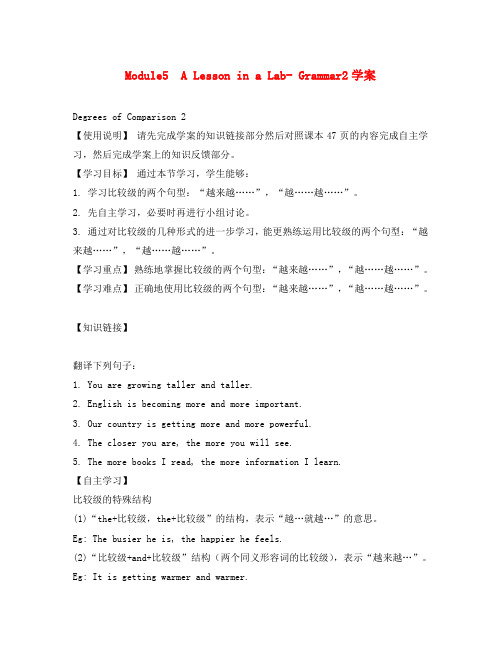
Module5 A Lesson in a Lab- Grammar2学案Degrees of Comparison 2【使用说明】请先完成学案的知识链接部分然后对照课本47页的内容完成自主学习,然后完成学案上的知识反馈部分。
【学习目标】通过本节学习,学生能够:1. 学习比较级的两个句型:“越来越……”,“越……越……”。
2. 先自主学习,必要时再进行小组讨论。
3. 通过对比较级的几种形式的进一步学习,能更熟练运用比较级的两个句型:“越来越……”,“越……越……”。
【学习重点】熟练地掌握比较级的两个句型:“越来越……”,“越……越……”。
【学习难点】正确地使用比较级的两个句型:“越来越……”,“越……越……”。
【知识链接】翻译下列句子:1. You are growing taller and taller.2. English is becoming more and more important.3. Our country is getting more and more powerful.4. The closer you are, the more you will see.5. The more books I read, the more information I learn.【自主学习】比较级的特殊结构(1)“the+比较级,the+比较级”的结构,表示“越…就越…”的意思。
Eg: The busier he is, the happier he feels.(2)“比较级+and+比较级”结构(两个同义形容词的比较级),表示“越来越…”。
Eg: It is getting warmer and warmer.(3) the + 比较级+ of the two (+n),表示两者中较…的一个。
Eg: He is the taller of the two.(4)“not + 比较级+ than”表示“A不像B那样…;A不如B…”。
高一英语备课《Module 5 A Lesson in a Lab》1st period教案 外研版必修1

Module 5 A Lesson in a LabⅠ.The General Idea of This ModuleThis module mainly introduces scientific knowledge and the operation and report of basic experiments to students. Questions can often lead to inquiry and phenomenon usually makes people think deeply. Thus, students can voluntarily practice and seek the truth on their own. In this module, we are going to learn some commonly used vocabulary and sentence patterns about scientific experiments. In terms of grammar, we’re going to learn the expressi ng ways of Degrees of Comparison. Besides, students should also learn to use the forms of modifier of Degrees of Comparison. In pronunciation, students are asked to learn the intonation of general questions and special questions. At the same time, after learning this module, students are required to improve their abilities of listening, speaking, reading and writing as well as some strategies of learning.experiments are enumerated(列举) inthis section. d. Students ought to get familiar with the meanings of the useful words and expressions so that they can get ready for the study activities.Besides, five activities have beendesigned here for the students to distinguish and calculate the numbers and percentage.we will learn degrees of comparison of the adjectives. It mainlydeals with the expressing ways of multiple.EADING AND VOCABULARYthis module. It also introduces oxide reaction of metals. The exercises designed according to the reading text enable the students to learn to use the relevant vocabulary by doing the exercises.method of fractions. It also supplies us some relevant activities.a dialogue of teachers and students who are doing an experiment. It gives us the activity on relevant experiment as well.part, the students are required to master the intonation of generalthe students shall learn several useful expressions of daily English.That is: “Where do we go from here?”“Keep the noise down.”“You’ve got it.”“It’s your turn.”“Go ahead!”the students are asked to grasp the use of first, next, after that,lastly and so on in a paragraph. They are also required to learn the usage of comma.students must learn the teaching conditions of senior high school education of Canada by reading this passage.Furthermore, the students are asked tocarried out in classgrammar, pronunciation andeveryday Egnlish learnt in this module.Ⅱ.Three-Dimensional Goals1.Knowledge and skills(1)Be able to master the key vocabulary and read the text fluently. Get to know something about science and technology, experimental reports.(2)The students are required to understand and master the usage of tractions and degrees of comparison of adverbs.2.Process and methods(1)Learn independently, under the teacher’s guidance.Try to get to know(2)Inquiry and activity. Students are required to understand its importance of scientific knowledge. The students will be aroused the enthusiasm for observing and analyzing problems.3.Emotion and valuesThe materials in this part can help students change their attitude towards study and arouse their interest of learning so that they can form their own goals of study.Ⅲ.Teaching Important PointsStudents should get to know some scientific knowledge and draw a conclusion by doing some experiments.students’ abilities of listening,speaking, reading and writing.Ⅳ.Teaching Difficult PointHow to improve the students’ ability of writing effectively.Ⅴ.Preparation of Teaching Aidsa tape recorder, multimedia, a computer and a slide projectorⅥ.Teaching Timefive periodsThe first period: Introduction, Vocabulary and SpeakingThe second and the third period: Reading and VocabularyThe fourth period: Vocabulary, Listening and Writing, Grammar 1-2The fifth period: Pronunciation Everyday English, Function and Cultural CornerThe FiIn this period, we are going to learn to say some large numbers quickly and correctly. And we will learn to use some new words.Teaching Aims1.Learn and master the following:Learn the meaning of the following words:liquid,expand,contract, substance, mixture, oxygen,2.1. Train the students’ abil2. Enable the Ss to recognize the numbers,Teaching Methods1. a com2.3.Teaching Procedures-T: Hello,Ss: Hello,T: Sit down, please. Now in this unit we are going to learn something aboutlet’s learnTeacher makes sure the Ss know the new words. Read the words after you.)Teacher asks the Ss to look through PartT:1.a2.a3.a4.a5.b6.bT:T:(The Ss work on their own.)T: Compare the answers in pairs.1.air—oxygen2.contract—expand3.earth—sun—moon4.gas—liquid—solid1. Electricity, iron,2. Steel, some metals and glass are man-and speaking1. Look at the numbers.(Show these numbers on the screen. Ask them to say the numbers. The English expression will be given when a student makes the answer.)76 seventy-876 eight hundred and seventy-2876 two thousand, eight hundred and seventy-32 876 thirty-two thousand, eight hundred and seventy-By this time,T: ReaThis is a good time the Ss learn how to say the large numbers. The teacher walks around the class and offers help when necessary.S: I’ve found the errors. The first two numbers are misrea dT: You’re right. But how can you say the numbers?S:The first one should be fifty-two million,four hundred and seventythousand, three hundred and eighty-T: Great! What about the second?S:T:3.Look a4.T:three thousand, five hundred and forty-thirty-three thousand, seven hundred and ninety-five hundred and twenty-two thousand, four hundred and eighty-three million, two hundred and thirty-The teacher collects some5. Look at these fractions SB,T:S:T: Is it right?S: No,T: Good! Next?S:S: Nine tenS:S:T: Who can describe the fractions in Activity 2 as percentages?S:S: Four-S: One-S: Three-quarters is theS:S: Two-S: Two-S: Five-S: Nine-S: Three-S: Five-sixT: Good! Your mathematics is excellent!6.T: Let’s turn to P43,Circulate, monitor and help where necessary. Call back the answers from the(1)3 000 000 (2)48 046 000(3)50 000 000 (4)265 693 096(5)750 375 000 (6)80 000 000T: Work in pairs. Give your partner five sums. Use numbers over a million. Yourpartner must find the answers. Work out the answers and then say them in words.1.2. Work in pairs. Look, listen, speak and write the larger numbers,fractions and percentages.Module 5 A Lesson in a Lab55 555 655 555 7 555 505 87 555 500mixture 987 555 5001 000 000 000Step 9 Activity and Inquiry。
高中英语 Module 5 A Lesson in a Lab(典句精讲)教案 外研版必修1

典句精讲1.The science facilities ar e very good with laboratories that have all the latest equipment.这些科研设备非常好,实验室配有最新的设备。
【巧解句构】w ith在此句中意思为“带有……”,其引导的短语对句子作附加说明,that haveall the latest equipment为定语从句,修饰laboratories。
2....and these are always very interesting,as the lectures are peopl e who have made real discoveries in their areas of science.这些讲座总是很有趣的,因为作讲座的人是在各自的科研领域里真正有所发现的人。
【巧解句构】as conj.“因为,由于”,在本句中引导原因状语从句。
as作连词可以引导多种状语从句,主要有时间、原因、方式、比较、让步等从句。
3.Th e Nobel Prize is the highest scient ific prize there is,so we should be very proud of that.诺贝尔奖是目前科学方面的最高奖,因此我们为此感到骄傲。
【巧解句构】there is为定语从句,修饰prize。
4.It is important to know how they r eact with different substances,fo r example,water and oxygen.了解它们如何同像水、氧气这样的物质发生反应的是非常重要的。
【巧解句构】1)it是形式主语,真正的主语是动词不定式to后面的部分。
2)how引导的句子作know的宾语。
【要点剖析】react with同……发生反应。
for example是不完全列举,“例如”。
高中英语 Module 5 A Lesson in a Lab教案1 外研版必修1-外研版高一必修1

Module 5 A Lesson in a LabThe Second Period Listening and SpeakingTeaching goals1. Target language:English numbers2. Ability goalsHelp the students to read and write some English numbers correctly.Help the students find the main parts of an experiment while they are listening.3. Learning ability goalsHelp the students know the rules of expressing numbers.Help the students guess the main parts of a listening material from the tips. Teaching important pointsLet the students pay attention to the key words in the materials about Aim, Equipment, Method, Result, and Conclusion.Teaching difficult pointsHelp the students read some large English numbers.Teaching methods:Listening and discussion.Teaching aids:A projector and a recorder.Teaching procedures & waysStep Ⅰ RevisionCheck the students’ homework. For Exercises 6 and 7, give them answer sheet. For Exercise 8, ask 10 students to read out the plete sentences one by one. They should pay attention to their pronunciation and intonation.Step Ⅱ Listening and WritingThis is a continued part to the reading material. The students can get more familiar with some new words and expressions, and also get familiar with the description of an experiment. Ask the students to scan the three activities in LISTENING AND WRITINGon P46, so that they know what they are going to do, and try to get ready to catch the key words or key sentences when they are listening.T: Now, please turn to page 46. We are going to have a listening. At first, scan the three instructions to know what you are going to do.Several minutes later.T: Do you know what you are going to do?T: What’s the first one?T: What is your prediction?T: Good, this is a correct attitude towards science. Now, we’ll listen to the conversation to find the result. So please listen carefully and write down the key words.Play the recorder for the students to have a first listening. After that, let the students write down their answers using the key words. If possible, ask them to write the whole sentences.T: Now let’s listen and plete the description of the scientific experiment. We’ve known the Aim and Result. What we should focus on is Apparatus, Method and Conclusion. And for Method, we should pay attention to the function words: first, then, next, after that, and lastly. Do you remember?T: OK, let’s listen again.Play the tape recorder again. The students listen to the recorder and plete their sentences. At last, collect the answers.Step Ⅲ Listening and Speaking (P95)This is another experiment for the students to have a listening. The purpose of the listening is the same as the above one. Ask the students to read the exercises before listening, including Exercises 13, 14 and 15, so that they know clearly what they are going to do.T: Now, we’ll have another listening. Are you clear about what you are going todo?T: OK, for Exercise 13, we have to decide what the aim of the experiment is. And then decide the correct order of the stages. So, first look at the pictures, work in pairs to describe what the boy is doing.Let the students do the job, and then collect their descriptions.T: Well, just now, I collected some of your descriptions about what the boy is doing. T: All of these descriptions are very good. Now let’s listen to the tape to find the aim and put the stages in the correct order.T: Well, it’s time for us to have a speaking. Look at Exercise 15. Take it in turns to describe the experiment. Use these words and phrases in the box.Give the students some time to do the job. And then ask one or two of them to read out their descriptions. Teacher can also leave this part as homework.Step Ⅳ Vocabulary and SpeakingIn this part help the students master the rules of reading English numbers. There are 3 tasks in this step: Task 1, Activity 1; Task 2, Activity 2; Task 3, Activities 3 and 4.T: Now, look at Activity 4. Read these questions aloud and say the answers. Work in pairs to take turns asking and answering the questions.Give them some help, if some of them have any trouble in doing this. After a while, check the answers with the whole class.If time permits, finish Activity 5. If not, leave it as homework.Step Ⅴ HomeworkT: In this class we listened to two materials and learned to read some numbers in English. It’s hard, but you have mastered all of them. You are terrific! Now, pay attention to our homework: One is to preview Vocabulary on page 46; The other is to finish Exercise 9 on page 93 and Exercise 15 on page 95. For Exercise 15, you’d better write them down, so that we can show them out on the screen. Next time, I’llcheck your answers to these exercises. OK, class is over, see you tomorrow.。
高中英语 Module 5 A Lesson in a Lab(第三课时)教案 外研版必修1
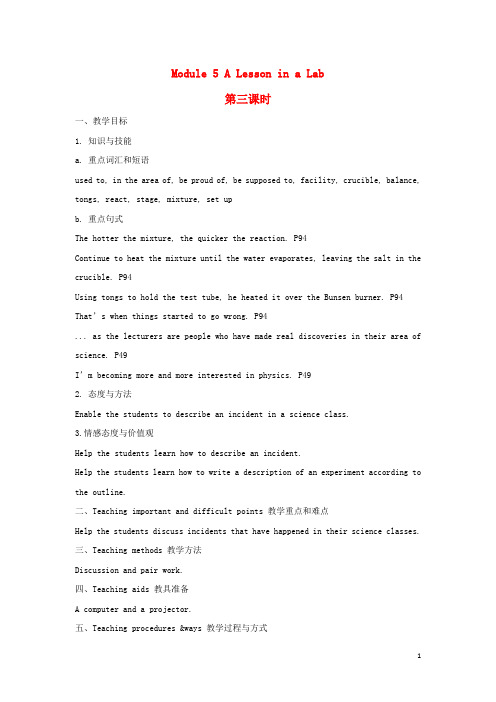
Module 5 A Lesson in a Lab第三课时一、教学目标1. 知识与技能a. 重点词汇和短语used to, in the area of, be proud of, be supposed to, facility, crucible, balance, tongs, react, stage, mixture, set upb. 重点句式The hotter the mixture, the quicker the reaction. P94Continue to heat the mixture until the water evaporates, leaving the salt in the crucible. P94Using tongs to hold the test tube, he heated it over the Bunsen burner. P94 That’s when things started to go wrong. P94... as the lecturers are people who have made real discoveries in their area of science. P49I’m becoming more and more interested in physics. P492. 态度与方法Enable the students to describe an incident in a science class.3.情感态度与价值观Help the students learn how to describe an incident.Help the students learn how to write a description of an experiment according to the outline.二、Teaching important and difficult points 教学重点和难点Help the students discuss incidents that have happened in their science classes.三、Teaching methods 教学方法Discussion and pair work.四、Teaching aids 教具准备A computer and a projector.五、Teaching procedures &ways 教学过程与方式StepⅠ RevisionCheck the students’ homework.For these two exercises, ask the students to read out the complete sentences. T: From Exercise 4, we know that we can use much, a bit, a lot, a little to modify the comparative expressions. Besides these, we have other words to do this. Now please look at the sentences on the screen. Read the sentences and pay attention to the bold face.You have far more imagination than I have.It’s slightly warmer today.She’s actually a good deal older than she looks.Do you feel any better today?She was no older than Zilla.You must go and get some more milk.He is fat, but his brother is still fatter.This book is even more useful than that one.My sister is ten years younger than me.You’re a head taller than Jane.It was one-fourth cheaper than the market price.After the students have finished reading, ask them to make a conclusion of the words to modify the comparative degree.T: By now we’ve learned many words that can modify the comparative degree. What are they?S1: They are much, a lot, far, a bit, a little, slightly, any, no, some, even, still, a head, ten years and so on.T: Yeah, that’s right. Now, that’s all for the home-work. Let’s come to Reading. Step Ⅱ Lead-inT: Do you know this man?S1: He is Ting Zhaozhong, a world-famous Chinese scientist. He once won the Nobel Physics Prize.T: That’s right. He is a top-class scientist. Many outstanding scientists think it is an honor to work with him. What he often says is “I don’t know”. We know science is a serious thing. You can’t be too careful in it. I think this is the real spirit that a scientist and the person who aims to be a scientist should have. Step Ⅲ Reading (P94)Task 1: Fast readingT: Now let’s turn to page 94 to see what happened in the chemistry lab. First, read the three summaries about this passage on page 93. After reading the passage quickly, choose the best one.Give the students some time to read the passage.T: Which one do you think can be the best summary of the passage?S1: No. 1 is the best summary, I think.T: Good.Task 2: Careful readingThe purpose of this task is to answer the eight questions in Exercise 11, and let the students get familiar with some new words in this Module.T: Now, let’s read the questions in Exercise 11, so that you can know what you should do when you are reading. Now read the passage carefully and find the answer to each question. Mark where the answers are and then number them. So that you can find them quickly when you need these answers.Let the students do the job in pairs. One asks the questions and the other answersthem. While the students are asking and answering the questions, walk around the classroom to see if they need any help. And at the same time, collect the answers. Step Ⅳ DiscussionT: Well, you often do some experiments in your science lessons, right? Did any incidents happen? Now I’ll give you some time to discuss the incidents that have happened in your science lessons.After a while.T: Who would like to report an incident that happened before?S1: I’d like to. One morning, we were doing a chemical experiment in the school lab. We fetched some solution(溶液) from the cupboard, including oil of vitriol(浓硫酸), and put them on the table. Wang Hua and Ding Ding were in the front row. Xiao Ming and I were in the second row. Suddenly, Wang Hua turned to say something to me, and turned over the bottle with oil of vitriol by accident. The bottle was not covered! The oil of vitriol splashed. Soon a hole was burned in Xiao Ming’s coat. And his hand was burned to black. He screamed. We were so worried. The teacher ran over to send Xiao Ming to the nearest hospital.Fortunately, nobody else was injured in the incident. However, it taught us a good lesson. Never leave a bottle uncovered on the table.S2: I’d like to tell you about one of the incidents in our chemical experiment. In the experiment, we used Bunsen burner. After the experiment, one of my classmates forgot to cover it. About ten minutes later, a teacher passed the laboratory and smelt the odd smelling. She immediately entered the lab and put out the fire. Fortunately, no further incident was caused. After that all the teachers and students were gathered to have a meeting. The headmaster gave a talk to em-phasize the importance of safety in lab. That’s a good lesson.T: Yeah, if the teacher didn’t notice the incident, it would have been a terrible fire. We often think it’s impossible to make an accident. But as a saying goes, “It’s not too careful to do a thing.” We should always keep the saying in mind. Step Ⅴ Cultural CornerT: In this Module, we’ve learned many things about scientific experiment. Maybesome of you find it interesting, because you are interested in science; while others may find it’s dull, because they prefer art lessons. In our class, who enjoy study-ing science? And why?S1: I like studying science. I like maths best. When I work out a problem, I feel very happy.S2: I like chemistry. It’s very interesting to see that you add one substance to another, and they react and change into a new substance. That is fantastic!T: Knowledge is power. Whatever subjects you enjoy learning, you should devote yourselves to them. Or you won’t make any achievement. Now let’s turn to page 49. Read the passage and answer this question: Why has Mark become more interested in science?Give the students some time to do this in pairs, and then check the answers. T: Are you ready to answer the question?Ss: Yeah!T: Why has Mark become more interested in science?S3: I think there are two reasons. One is that the science facilities are very good in the new school, with laboratories that have all the latest equipment. The other is that they have four chances each term to public science lectures, and the lecturers are people who have made real discoveries in their area of science. I think Mark is a lucky person.T: Yeah. Situations can change a person. In fact, we also have the same chance to learn some knowledge outside class. Channel 10 on CCTV offers a lot of lectures about science and art. Some are given by famous professors. One of my favorite programs is “百家讲坛”. If you often watch it, I believe you’ll benefit from it. Step Ⅵ Summary and HomeworkT: We have learned a lot about scientific experiments. Nowadays, it seems that most people prefer science, because they think science can bring financial benefits, while they do not pay much attention to morality, ethics and love. As a result, there are many disasters and wars in the world. So when we are learning science, we should also pay attention to morality, ethics and love. Today’s homework is to previewPRONUNCIATION and EVERYDAY ENGLISH. OK, time is up. So long, everyone.Ss: So long, teacher.六、板书设计重点词汇:used to, in the area of, be proud of, be supposed to, facility, crucible, balance, tongs, react, stage, mixture, set up重点句式:The hotter the mixture, the quicker the reaction. P94Continue to heat the mixture until the water evaporates, leaving the salt in the crucible.重点语法:used to七、教学反思:这节课的学习,不仅达到了生生互动的效果,也体现了师生互动的优势。
高中英语:module5 a lesson in a lab-reading教案 外研版必修1

Module 5 A Lesson in a Labreading教案Teaching aims and demands:1. To learn about some vocabulary and knowledge related to science and experiments.2. To know about some metals and get to know their main uses in our lives.3. To make the students know how to do a simple experiment and write the report about it in English.4. To deal with all the activities1-6 about passage A and passage B on page 44-45.5. To develop students’ expression ability as well as reading ability by practicing these two passages.6. To raise students’ interests in science and form the rigorous scientific attitude.Teaching key points:1. To make the students understand and grasp the vocabulary and knowledge related to science and experiments.2. To enable the students to know how to read some passages about simple scientific experiments. Teaching difficulties:To make students learn how to write an experiment report in EnglishTeaching methods:⒈ municative Approach⒉ Task-based Approach⒊ Aural-oral Approach with the help of the multi-media puter and the recorderTeaching aids:Multi-media puter; Software; PowerPoint; RecorderTeaching procedures:Step 1:Lead-inAt first show the students the picture of a lab with the help of puter.Then design the following questions and ask the students to discuss them in groups:1.Are you interested in doing scientific experiments?2.Suppose you want to do a chemical experiment about some metals, do you think it is necessary to know about how they react with other substances?3.In order to carry out an experiment successfully, what should you prepare for it?This step is to warm up the students and raise their interests to speak English in class. Because all these questions are very close to the students’ daily life and studyingStep 2. Pre-readingTeacher: Since you are interested in doing scientific experiments, now let’s get to know some vocabulary and knowledge related to science and experiments.At the same time I can type out some pictures about some metals on the screen with the help of the puter as follows:⑴potassium(钾) ⑵sodium(钠) ⑶calcium(钙) ⑷magnesium(镁)⑸aluminium(铝) ⑹zinc(锌) ⑺iron(铁) ⑻copper(铜)As I type out each of the above pictures, I can ask the students like this: What’s this? Andwhat can it be used for?At this moment the students’ interests are probably approaching a climax. So I further ask them like this: Do you want to know more about these metals? And do you know how we can use these metals better? Well, t his is what we’ll study very soon.This step is employed to create a language environment for students’ munication and arouse their interests in reading passage A and passage B on page 44-45Step 3. Re adingPassage AT: Well, let’s read through pas sage A with the tape of it very quickly to try to catch its main idea.Then finish Activity 2 on page 44 and give your reasons.Next, ask the Ss to read passage A very carefully to find out the answers in Activity 3 on page44. Finish this activity by multi-media puter. It can be designed as follows:1.Which of the metals in the table reacts the most with oxygen and water?Potassium, calcium and sodium.2.What happens when you heat calcium in oxygen?It burns to form an oxide.3.Which metals react with steam?Magnesium, aluminium and zinc.4.Does iron have a slow or fast reaction with steam?It has a slow reaction.5.Does copper react with water?No, it doesn’t.Passage BT: Well, from passage A we can see how interesting the experiment about the reaction of metals is! But do you know how we can carry out a chemical experiment in a lab successfully? And what is the correct order to describe a scientific experiment?Ask the Ss to look at Activity 1 on page 44 and give them about 2 minutes to discuss it. Thencollect the answers from them. At the same time type out the correct answer on the screen with the puter as follows:T: Now, let’s e to see “ A simple scientific experiment 〞!Then play the tape of passage B for the students and ask them to read the passage with the tape quickly and finish Activity 4 on page 44. In order to lead the students to read the text very carefully, the following task-based questions can be signed to ask them to answer:⑴Can you guess the meaning of the word “apparat us 〞 through the context? Have you known all of the apparatuses of this experiment?⑵In the second part of the experiment, why must you boil the water? And then why do you add some oil to the water?For Question 1, some students maybe feel strange to some apparatuses. If so , the following pictures can be typed out with the help of puter to help Ss to know about:Then in order to make the Ss consolidate what they read in passage B and check if they have understood the experiment very well, Activity 5 on page 46 can be typed out on the screen with the help of puter as a task-based activity 。
高中英语Module 5 A Lesson in a Lab 教案

Module 5 A Lesson in a LabThe First Period ReadingTeaching goals教学目标1. a. 重点词汇expand, contract, conclusion, method, liquid, solid, iron, mixture, oxygen, electricity, aim, equipment, react, result, steam, substance, boil, float, form, dissolve, rustb. 重点句式It is hard to think of a world without metals.It is important to know how they react with different substances, for example, water and oxygen.This makes sure there is no air in the water.2. Enable the students to describe a scientific experiment.Enable the students to learn some words concerning scientific experiment.3. Help the students learn about the steps of a simple scientific experiment so that they can describe a similar one.Teaching important points教学重点Help the students learn how to describe a simple scientific experiment.Teaching difficult points教学难点Help the students understand the two tables of Passage A and Passage B.Teaching procedures & ways教学过程与方式Step ⅠWarming-upThe purpose of this part is to let the students know and get familiar with the new words in INTRODUCTION: expand, contract, mixture, substance, oxygen and electricity. First, write down the words on the black-board, and then teach them the meaning of each word by questioning.T: Hello, everyone! Do you know the program Lucky 52 on CCTV?Ss: Yeah!T: OK, now suppose I’m Li Yong, and you are competitors. Here are six words on the blackboard. What you should do is to guess the meanings of them. If you can’texpress them in English, you may say in Chinese. The quicker, the better. Are you clear?Ss: Yes.T: Listen. What do we take in when we breathe?S1: Air.T: Right. But not exact.S2: 氧气。
外研版高中英语必修一备课Module 5 A Lesson in a Lab单元学案

Module 5 a lesson in a lab单元学案Ⅰ知识点回顾1 .react with ____________ react to __________ react on ____________2.add to ___________ add……….to __________ add up_______ add up to________3.keep out __________ keep out of _______ keep off____________keep down________ keep up _______ keep away __________4. used to do_________ 否定结构_____________5. be proud of sb/ sth / doing ______________________ take proud in_____________________6. find out find填空: We should _____________ who took the machine away.He has _______________ his lost bike.7. put…in order ___________________8. in turn_____________ by turns________________ in return ____________________9. follow sb’s instructions__________________________10.electrical equipment_________________ electric fan__________________11.air-free water__________________ trouble-free areas____________________12.at the top __________________ at the bottom ______________________13.be supposed to do __________________ be supposed to be done_______________________14.go ahead______________ 15.got it ________________ make it____________________16.It’s your turn__________________________17.Keep the noise down__________________________18.Where do we go from here? ________________________________Ⅱ重点句型:1.修饰比较级的词语: a bit / a little / a lot / a great deal / much / rather / any / still / even / far /by far /E.g: Is he ___________ better today? This one is _______________ worse.2.the more… the more… __________________ more an d more_______________________E.g: It is ________________ (越来越冷).The more you read,___________________(你发现越容易).The more you sleep, _________________(你越懒)Ⅲ单词拼写1)Is steel a _________ (混合物) of iron and other substances?2)Professor Wang will give us two _________ (演讲) tomorrow morning.3)The science facilities are very good , with laboratories that have all the latest ________ (设备). 4)After discussing it for several days ,they finally drew a _________ (结论) .5)Montreal and Ottawa University both have good Physics __________(系).6)It’s important to know how they ________(反应) with different substances.7)I saw some fallen leaves ______(漂浮) in the river.8)His parents were ________ (吃惊的) at what he said.9)It’s important for us to keep the ________ (平衡) of nature.10)When you heat a metal ,it ______(膨胀).Ⅳ单项选择1. I am proud ________what I have done.A. forB. inC. ofD. to2. There are only ________natural resources as there were thirty years ago.A. as half muchB. as half manyC. half so muchD. half as many3. Her hair's the same colour ________.A. of her motherB. as her motherC. with her mother'sD. as her mother's4. Would you please put these sentences ________? They are jumbled now.A. in the orderB. in orderC. to the orderD. to order5. Medical experts of China are devoted to ________the ________of SARS and waysof dealing with it.A. finding out; causeB. find out; causeC. finding out; reasonD. find out; reason6. ________you forget it, ________you'll suffer from it.A. Sooner; lessB. The earlier; lessC. The earlier; the lessD. The sooner; the less7. The Great Wall has been ________several times. The repair work is done every year.A. addedB. adding toC. added toD. added in8. You can't, imagine that rats eat 40 to 50 times ________.A. in weightB. by weightC. of weightD. their weight9. Mr Smith is ________a teacher. He is also our good friend.A. onlyB. more thanC. no more thanD. nor more than10. This is the ________model, which has just been developed.A. lateB. latestC. laterD. lately11. We don't do it in this way now, but it ________in this way.A. used to doB. used to be doneC. was used to be doneD. was used to doing12. He ________to come at eight, but in fact he never comes before nine.A. is supposingB. supposesC. is supposedD. supposed13. Look! The ________leaf is floating just like a little plane.A. fallingB. growingC. grownD. fallen14. ________of the forest is covered with trees of broad leaves, while the rest pine trees.A. Three quarters; isB. Three quarters; areC. Three fourths; areD. Three fourth; is15 With a lot of difficult problems ____, the _____ president is having a hard time.A. settling; newly-electedB. to settle; newly-electedC .settled; newly-elected D. to settle; new-elected16 Canadian researchers have shown that the shorter the index finger is , ____ the ringfinger,____ aggressive men are likely to be.A. compared with; moreB. comparing to; the muchC. compared to; the moreD. comparing with; the more17 Make sure that electricity in the lab ___ when you finish doing experiment.A. will be turned offB. have been turned offC. is turned offD. turns off18. _____ production up by 60% , the company has had another excellent year.A. AsB. ForC. WithD. Through19---It was careless ___ you to have left your clothes outside all night.--- My God! _____.A. of; So did IB. for; So did youC. for; So were youD. of; So I did20.The engine of the ship was out of order and the bad weather _____ the helplessness of the crew at sea.A. turned outB. resulted fromC. added toD. made up参考答案:1.mixture 2.lectures 3.equipment 4.conclusion 5.department6.react7.floating8.astonished9.balanced 10.expands 1—5CDDBA 6—10DCABB 11---15BCAAB 16---20 CCCBC。
高中英语 Module 5 A Lesson in a Lab教案 外研版必修1 教案
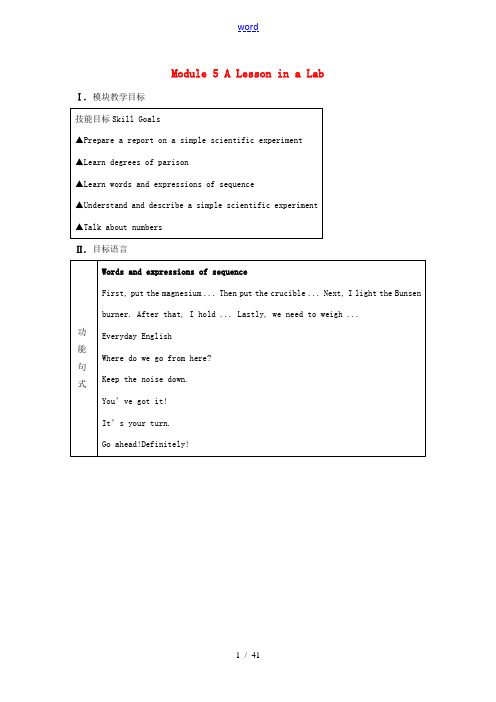
Module 5 A Lesson in a Lab Ⅰ. 模块教学目标Ⅱ. 目标语言Ⅲ.教材分析与教材重组1. 教材分析本模块以“A Lesson in a Lab”为话题,旨在通过模块教学,使学生了解一些基本的科学实验知识,学会怎样写实验报告,并掌握一些相关的词汇与短语,激发学生对科学的兴趣。
此外还要求学生学会读一些大的整数、分数及小数。
从文化的角度来看,鼓励学生了解国外有关科学教学的情况,以扩大学生的知识面,从而激发他们的学习兴趣。
1.1 INTRODUCTION 这部分由三个内容组成。
通过听材料,归纳词语和回答问题这三个形式来完成本部分所涉及到的与科学、实验有关的词语的练习,为以后的各项活动做好准备。
1.2 VOCABULARY AND SPEAKING 这部分设计了一些数字,包括整数、分数和百分数,并通过一些练习让学生熟悉并正确使用英语数字的读法。
1.3 GRAMMAR 1 这部分介绍了形容词比较级中有关倍数的两种主要用法:... times ... than ...和... times as ... as ..., 并通过对比练习来加强学生对这一用法的了解。
1.4 READING AND VOCABULARY 这部分由两篇短文组成。
Passage A 介绍了金属在生活中的重要性,并列举了一些金属在氧气、水及蒸气中的反应及其结果。
Passage B 介绍了A SimpleScientific Experiment,要求学生学习如何描述或写一个科学实验报告。
通过对这两篇文章的学习,学生还可以学会一些科学词汇,有助于今后阅读一些相关的文章。
1.5 VOCABULARY 该部分介绍了带分数的读法,及一些实验仪器的词汇,并配有相关练习。
1.6 LISTENING AND WRITING 这部分听力的内容是实验中的师生对话。
我们可以将此作为对阅读内容在语言技能上的补充。
听力问题的设计本身已经显示了做听力练习的技巧。
高中英语 Module5 A Lesson in a Lab 4 period 外研版必修1 教案
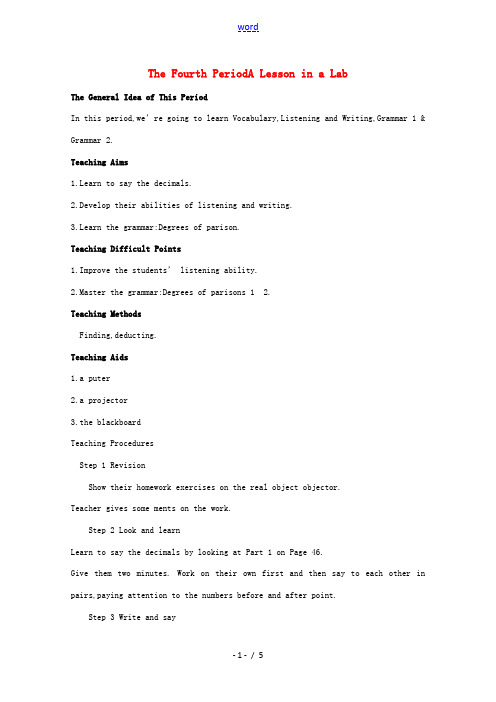
The Fourth PeriodA Lesson in a LabThe General Idea of This PeriodIn this period,we’re going to learn Vocabulary,Listening and Writing,Grammar 1 & Grammar 2.Teaching Aims1.Learn to say the decimals.2.Develop their abilities of listening and writing.3.Learn the grammar:Degrees of parison.Teaching Difficult Points1.Improve the students’ listening ability.2.Master the grammar:Degrees of parisons 1 2.Teaching MethodsFinding,deducting.Teaching Aids1.a puter2.a projector3.the blackboardTeaching ProceduresStep 1 RevisionShow their homework exercises on the real object objector.Teacher gives some ments on the work.Step 2 Look and learnLearn to say the decimals by looking at Part 1 on Page 46.Give them two minutes. Work on their own first and then say to each other in pairs,paying attention to the numbers before and after point.Step 3 Write and sayT:Now write and say the numbers as decimals.S:Point five.S:Two point two five.S:(naught) Point seven five.S:Thirty point five.S:Twelve point three.T:Learn to say the fractions on Page 46.Work in pairs and report the answers to the class.Keys:a half two and a quarterthreequartersthirty and a half twelve and three tenthsStep 4 PracticeWrite 5 fractions for each one to say.Step 5 Listening and writingT:Read the listening material and try to predict what you will hear.(It’s a good way to train their listening ability.)Play the cassette for them to listen.Listen another time for them to plete the description of the scientific experiment. Listen a third time.Step 6 Grammar 1:Degrees of parison 1Learn how to use multiple in degrees of parisonT:In junior middle school,we learned the sentence:“The earth is larger than the moon.” We add “forty-ni ne times” to the sentence on P43.Have you noticed the word order?T:What do we say “两倍” in English?S:Two times.T:Is it right?S:No.It’s twice.T:Now please answer the questions in Part 1,P43.S:It should be like this:I went there twice.T:What about No.2?S:20 metres.T:No.3?S:Object B is 400 kilogrammes.Step 7 PracticePart 2 SB,P43Work on your own first and then check the answers together.1.Yangtze River is about three times as long as Songhua River.Yangtze River is about three times longer than Songhua River.2.Winter in Harbin is four times as cold as that in Beijing.Winter in Harbin is four times colder than that in Beijing.3.Mount Qumolangma is about six times as high as Mount Tai.Mount Qumolangma is about six times higher than Mount Tai.4.My aunt’s house is twice as large as mine.My aunt’s house is twice larger than mine.5.Tom weighs twice as heavy as Lily.Tom weighs twice than Lily.Step 8 Grammar 2:Degrees of parison 2T:Find the grammatical rules in the first three sentences on P47.S:The first sentence contains the structure “more and more”.T:Good!S:The next two contain the structure “the more...the more...”.A1、2、3 B 2、3 C1Step 9 Part 2,SB,P47T:Make sentences according to the example. Work on your own first and then check theanswers together.1.The hot metal is getting bigger and bigger.2.The magnesium is getting hotter and hotter.3.The sun is getting stronger and stronger during the morning.4.The sea is being warmer and warmer.Step 10 Assignment1.Study Parts 3-4 on P47-48.Find out more words or phrases which can modify thedegrees of parison.2.Wb,Exx.1-2,P91Step 11 The design of the writing on the BlackboardModule 5 A Lesson in a LabTheFourthPerioda halftwo and a quarterthree-quartersthirty and a halftwelve and three tenthsmoreandmorethe more...the more...Step 12 Activity and InquiryDegrees of parison 2Activity Look at these sentences:1.e a bit closer.2.We need rather more than that.3.It weighs a little more than before.4.It’ll be a lot heavier than magnesium.5.Is it any heavier?6.We need a piece which is (very) much bigger than that.Steps Students’ Acting Teacher’s Organizing1 Read through the sentences. Ask the students to read through thesentences.2 plete the activityindividually. Get the students to plete the activity individually.3 Work in pairs to pare theiranswers. Put the students in pairs to pare their answers.。
- 1、下载文档前请自行甄别文档内容的完整性,平台不提供额外的编辑、内容补充、找答案等附加服务。
- 2、"仅部分预览"的文档,不可在线预览部分如存在完整性等问题,可反馈申请退款(可完整预览的文档不适用该条件!)。
- 3、如文档侵犯您的权益,请联系客服反馈,我们会尽快为您处理(人工客服工作时间:9:00-18:30)。
Module5 A Lesson in a Lab- Grammar1学案
Degrees of Comparison 1
【使用说明】请先完成学案的知识链接部分然后对照课本43页的内容完成自主学习,进一步巩固有关形容词和副词比较级的用法及相关知识,然后完成学案上的知识反馈部分。
【学习目标】1. 熟练地掌握比较级的几种形式并学习倍数的三种表达方式。
2. 先自主学习,必要时再进行小组讨论。
3. 通过对比较级的几种形式的进一步学习,能更熟练的运用形容词和副词比较级。
【学习重点】掌握比较级的几种形式的运用及倍数的三种表达方式。
【学习难点】掌握比较级的结构并学会应用比较级。
【知识链接】
完成下列句子:
1. This bridge is twice _________that one.
这座桥是那座桥的两倍长。
2.This car is __________a new one.
这辆车和新的一样。
3. Jack is______ _his brother.
杰克和他弟弟一样高。
【自主学习】
形容词和副词的比较级的用法:
英语中的形容词和副词在表示“比较”概念时要用特别的形式,称为比较级(the Comparative Degree)。
1. 原级比较:表示两者程度相同,用句型“as+形容词/副词+as…”。
否定结构为:not as/so +形容词/副词+as…
E.g: Tom speaks as quickly as his cousin.
汤姆说得和他表兄妹一样快。
2. 比较级
(1) 表示“一方超过另一方”时,用“形容词/副词的比较级+than”的结构表示。
(单音节的比较级
由形容词/副词原形+er构成;多音节词的比较级由more+形容词/副词原形构成。
)
E.g: Our classroom is brighter than yours.
(2) 表示“一方不及另一方”时,用“less+形容词/副词比较级+than”的结构。
E.g: This room is less beautiful than that one.
3. 表示倍数的几个句型:
(1)…倍数+ as + 形容词原级+ as…
(2)…倍数+ 形容词的比较级+ than…
(3)...倍数+ the + n.(size, lengt h, width, height, depth)+of…
4. 在比较句中为了避免重复,通常用that(those),one(ones)代替前面出现的名词。
Eg : A box made of iron is stronger than one made of wood.
5. 比较级的省略现象:
—What do you think of the film?
—Wonderful. I have never seen a better one. (one 后面省略了than that one.)
6. 在形容词比较级前可以用:even, still, much, rather, any, far, by far, a little, a bit, a lot 等词来修饰。
E.g: Are you feeling any better?
【知识反馈】
【基础训练】(C 级)
I. 请你先完成课本上第43页Grammar1的练习1,2.
II. 根据中文意思填空:
1. Asia is _____ times __ _ large __ _ Europe. 亚洲是欧洲的四倍
2. Asia is _____ times_____ than Europe. 亚洲比欧洲大三倍。
3. Asia is _____ times_ __ __ __ _ _ Europe. 亚洲是欧洲的四倍.
4. _ _ __ _ _ _ Asia is _ __times _ __ of Europe. 亚洲是欧洲的四倍。
【能力提升】
选择题(B 级)
1. The harder you work, _______.
A. the greater pro gress you’ll make
B. the greater you’ll make progress
C. you’ll make the greater progress
D. you’ll make greater progress
2. Of the two books, this one is_______ one .
A. a thinner
B. the thinner
C. the thinnest
D. a thinnest
3. Our neighbor has _______ours.
A. as a big house as
B. as big a house as
C. the same big house as
D. a house the same big as
4. As a rough estimate, this country is ______that one.
A. three times the size as
B. the size three times of
C. three times as the size of
D. three times the size of
5. What a table! I’ve never seen such a thing before. It is ______it is long.
A. half not as wide as
B. wide not as half as
C. not half as wide as
D. as wide as not half
6. He speaks English well indeed, but of course not ______a native speaker.
A. as fluent as
B. more fluent than
C. so fluently as
D. much fluently than
【高考连接】(A 级)
The information on the Internet gets around much more rapidly than _______in the newspaper. (2007,辽宁)
A. it
B. those
C. one
D. that
【自我评价】对于本节课你的表现,你自己觉得满意吗?请进行自我评价。
【课堂小结】通过本节课的学习,你掌握了哪些知识?以后做题过程中需要注意哪些问题?。
